Leading a peasant revolt in Battle Brothers: Part 2
We return to the Darklands for a grim conclusion.
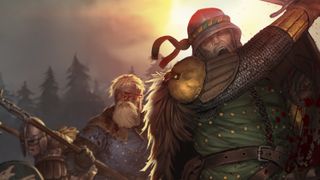

This diary first appeared in PC Gamer magazine issue 354 in February 2021. We do one every month, taking on new challenges and approaching our favourite games from entirely new angles—and letting you know how we got on.
Haven't read Part One yet? Hit that link!
The locals in Waidtal call the monstrous spiders that live in their woods 'webknechts'. The things are horrors the size of a large dog. After a day spent wandering the woods we find a boy hiding beneath a handcart surrounded by the strewn remains of a travelling group. It's a quick tracking job from there, across the trade road and into a stretch of woods where the branches are thick with webbing. We march in. It's an ambush.
A wave of spiders comes skittering in from the trees. They come from every direction, so we have to fragment our usual battle line to hold gaps in the trees. Leonhard the Poacher puts down a spider with each javelin tossed.
The sheer number of creatures is intimidating, but they practically throw themselves on our spears. We can hear more of them in the woods. Our shield wall spreads out into a wide ring to try and cover all the gaps. The lads get spooked and send out two rookies to scout.
It doesn't work. A scout comes running back towards us—Bertwin, someone says his name was—screaming about eggs bursting open, but a spray of webbing from deeper woods trips him up. He dies there, just out of reach, and more spiders come swarming in over his corpse.
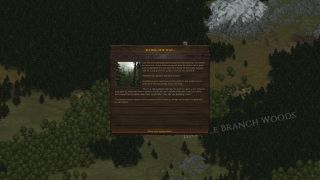
Slow and steady
The only bright spot in this is Albrecht the Sloth, a supposedly-lazy beggar, who turns out to be pretty good at bashing spiders with a club. We've seen it before: some people find purpose on the battlefield. Only in our horrible line of work, we self-appointed mercenaries of and for the people, could we have learned that.
We spend the late summer ranging the forest towns, going up to the tundra city of Bolasted to sell our loot. We gain some renown putting down bandits, beasts and raiders for magistrates and councilmen. We get some real gear and experience. Gebhard, Walram, Alfred and Thilmann have mail shirts or brigandine plates over leather, real helmets and proper arming swords. Gero the farmhand gets a real metal flail. And Leif becomes very, very deadly with his axe.
The biggest gaming news, reviews and hardware deals
Keep up to date with the most important stories and the best deals, as picked by the PC Gamer team.
After weeks in the woods we head towards home. In Bolasted we hire two men definitely fleeing from the law: a strong young gravedigger called Oskar who says the last grave he dug was his evil father's, and a man named Balon the Weasel who's running from debts owed to some nobles. We think they're exactly our kind of scum.
Back home in Bokenberg, elder Bjarne says they've had trouble with graverobbers north in the copper mining town Hohenau. Some kids reported disturbed graves and freshly overturned earth out in the mountain hollow where the town's dead are buried. It's a bad deal: the Hohenau council are only offering 450 crowns for a fix. "Graverobbers are usually idiots," says gravedigger Oskar.
Of the twelve founding members, eight are still alive. All proud northmen seeking justice for the evils that the nobility have done to us, seeking freedom through the life of the mercenary. All are from this region, six from this very town. Underpaid or not, we still take the job.
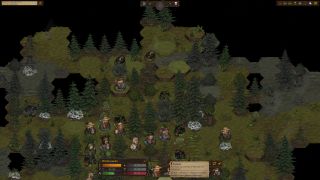
Boned
The graveyard is deserted when we arrive, but the white of the snow is marked in places by sprays of fresh black earth. Are they taking the dead from their graves? The only sound is our breathing, the crunch of snow underfoot, and the only movement our steaming breath. Then scraping and cracking as a nearby grave erupts in a spray of earth clods. The graverobbers aren't taking the dead: they are the dead.
The eyeless corpse of some grey-headed warrior stumbles forward, jaw missing, revealing only a flopping purple tongue. More rise from other graves—five, then ten of them. Wiedergangers. Those who walk again.
We've heard tales of the dead. They never tire, never suffer fatigue, never quit. They have to be hacked limb from limb before they'll lie still. But they're slow and stupid. Thilmann snaps out of it first, bellowing at the men to form up and lock shields. The dead slam into the hard middle of our wall, veterans like Gebhard and Walram, who stand firm.
I know we can't be passive here. We'll tire out, but they won't, and a tired mercenary is a dead one. I give the signal and our battle line collapses in on the foe. Leonhard the poacher tosses a javelin and it takes one's whole face off, but it gets back up. It doesn't get back up when noseless Leif's heavy axe splits its skull in two. Farmhand Gero wades in, flail whistling circles, and plants its spiked ball in two rotting skulls, one after the other.
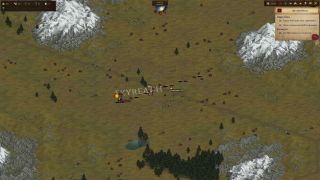
Finally nothing dead is moving. We call the roll and miraculously, no-one is hurt. I fear what festering wounds those rusty blades would have left. We march back to collect our pittance. The councilman of Hohenau is pleased, but it's clear he knew there weren't any graverobbers.
Stopping in Bolasted we take a job guarding a south-bound caravan. Far south: new lands, a warm sun and new nobles. Nobles who can't exactly take revenge on our friends and families if we take a bit of what we deserve from them.
The road passes first familiar towns like Waidtal, then big cities we've only heard of—Schanzberg, Dustermark. Crossing the mountainous ridges of the giant's slopes and going through the thick, black forests of Tickbrake, we come to flat valleys. Steppeland punctuated snow-capped mountain ranges. It's an uneventful journey, but we're paid pretty well for it.
The town we've arrived in, Dornheim, is a bizarre place. There are things here we've heard of but never imagined we'd see: the long trellises of a wine vineyard. Colourful vats of a dye where linen goes from tan to brilliant red or blue. These people should be living fat, but they're not. The House of Krieger rules these lands, violent nobles and the cause of a dozen wars. Their taxes are twice what we pay in the north. And what do the good people of Dornheim get for these taxes? Nothing. First day in town a local merchant begs us to take a job ridding the tradeways of steppe bandits.
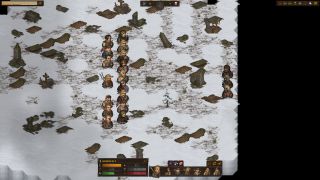
Trading up
We take the battles nobles will not. For this, the south is good to us. We get money, a lot of it, and hire new men who share our cause. We even journey to the edge of the deserts, to the rich city-states there.
The furs and hardwoods we brought from the north fetch absurd prices here. That's not to say our life isn't hard. There are losses: a spear to the foot and we almost lose Gebhard. Gero gets beheaded by a brigand's falchion. We lose Reinhold the Minstrel to a desert ghoul, a corpse-eater that emerges from a dune unseen and devours him whole. The camp is quieter after that. It's losing Leonhard that's hardest though.
Our poacher was a fixture of the company. Once he's gone, only six of the twelve, the ones who set out from Bokenberg in search of freedom, remain. The night he died I found Thilmann crying alone by the latrine pit. I tell the lads we're headed north. But first, revenge.
We hated the Von Kriegers before we got here not just from reputation, but by experience: before we were mercenaries we were a peasant levy, and the Kriegers were the sons of whores who we were levied to defend against. They're the whole reason we became those who fight for the common people.
We spot a Krieger supply caravan winding its way across the steppe and fall on it in a quick, vicious ambush. Their men are brave and disciplined, wearing shiny new mail, and march in lockstep to meet us. The poor, stupid bastards fight entirely too fair. We throw nets, purchased from the desert cities, to ensnare them and then slip daggers into the gaps in their armour. We take everything we can carry and burn the rest.
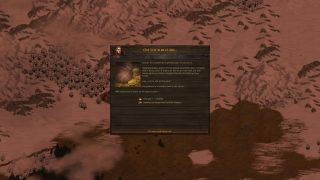
We hit another caravan the next day. Between our nets and our numbers a handful of well-armed guards stand no chance. Flush with gold, silks and spices we return north before the House of Krieger can muster a proper response. We eat and drink well, we're the richest people we know by far, now. Proper mercenaries with feathered hats and goblets for our wine.
Back in Waidtal we decide to take one last job before we head home. Councilman Ulrich, one of our first-ever clients, points us to a forest monk, a druid. Some important relic has been stolen from their order and lies in the Grim Tombs. We know where that is, we say, because we mapped its location once for a cartographer.
The tombs are as we remember them. Stretches of ancient walls and graves and crumbling colonnaded mausoleums. A lifetime ago Leonhard said they were ruins from the old empire. When we approach, the dead come clanking out of the forest mist. Not shambling, bloated corpses like the Weidergangers, but skeletons in rusted armour and greened bronze helmets. The clanking battle line of the ancient wars.
They march in lockstep, keep their shields up, stay in formation. We're outnumbered, and the untiring dead might outlast us in a clash of shields. I have the men fall back to use a stone wall as a bastion. We'll limit how many dead can come at us at once. It doesn't work. Gebhard has a mangled foot from that nomad's spear. Too slow to fall back, he's caught. Half the men rush up so he's not overwhelmed. We've outfought the dead once before.
The first wave, lightly armoured auxiliary troops, we do win. The second wave is worse, a tight shield wall of ancient legionaries, thickly armoured, with spear and short sword and tall oblong shields. The soldiers that carved an empire across the entire world.
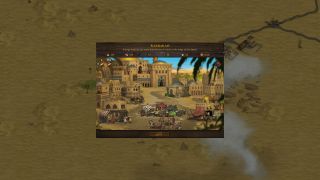
End of the line
The failed withdrawal leaves our men in two groups. The less experienced men get fatigued, make mistakes and die. I was a fool to think our shields could hold against the dead. The dead do not tire. They do not make mistakes.
Perhaps if we'd brought more axes we could have hacked through those shields. But we didn't. We don't. More men tire and fall, then veterans. Leif is cut down, then Oskar, Albrecht. Gebhard is speared in the throat. Walram's guts get spilled by a broken, rusted sword.
It's a slaughter. We break and run. Alfred the Fisherman, the brilliant man who thought to use nets against the noble troops, gets surrounded and left to die. We don't stop running until we're out of the trees and into the tundra. There are only five of us left. Fritz the Butcher deserts that night.
By the time we reach Bolasted it's clear to everyone that our dreams of a new world, of freedom, are over. The last three of the originals are Wolfgang, Thilmann and myself. We sell the company's armoury and disappear with the pay chest. We burn the company charter over a fire out on the plains. We think we'll go back south, past the desert, and buy a plantation of date palms by the sea. Maybe we can buy a little peace, too.
At least we never sacrificed our principles, even if we did sacrifice quite a lot of our brothers along the way. For a brief time, we were a true company of the people.
Jon Bolding is a games writer and critic with an extensive background in strategy games. When he's not on his PC, he can be found playing every tabletop game under the sun.
Most Popular


